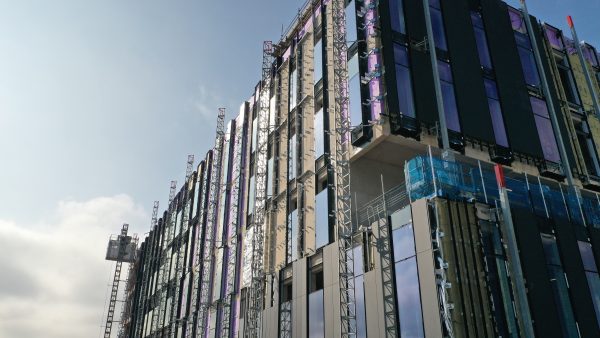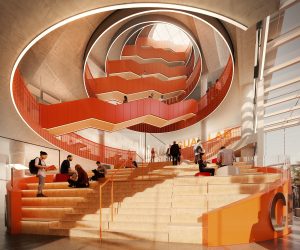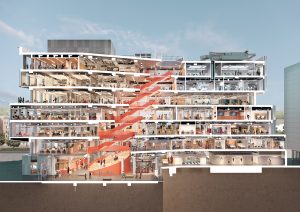Sparking the imagination
29 September 2020
Drone film footage recently captured the physical impressiveness of the sbarc | spark building – soon to be home to interdisciplinary social science researchers, students and a range of external partners. Here, Pro Vice-Chancellor Professor Damian Walford Davies goes beyond the material to imagine a walk through the completed building and the experience of meeting sbarc | spark’s most important assets as he heads to a morning meeting . . .
 Stepping inside, I’m struck – instantly – by light and space. As I pass through double doors into the glass-walled foyer, sunshine illuminates the arched entrance to the event space – an agora for pitches and presentations on tomorrow’s ideas from our greatest resource: people.
Stepping inside, I’m struck – instantly – by light and space. As I pass through double doors into the glass-walled foyer, sunshine illuminates the arched entrance to the event space – an agora for pitches and presentations on tomorrow’s ideas from our greatest resource: people.
Perched inside on flexible seating cubes, three students chat. A social scientist, a medic and a social geographer are plotting out what will become a hugely successful start-up that will assist health service managers to predict demand.
I round the curved wall of this multi-use event space. Only last week, Europe’s leading social scientists exchanged ideas here; tomorrow, school children will disentangle balls of string in a hackathon challenge. The game-changers of the future.
Conversations buzz in the open-plan space that hosts the sbarc | spark team, colleagues from Research and Innovation Services, outwardly facing university colleagues and hotdesking visitors and advisors. The aroma of good coffee alerts me to the prospect of the day’s first cup. Research is primary; coffee is also key. I join the queue in the welcoming café and briefly take a seat, sifting emails. By lunchtime, over 100 diners will be fortified by our local independent caterers’ creations.
Colleagues: everywhere deep in creative conversations. A researcher from the Wales Centre for Public Policy hails a friend from Y Lab – the Public Services Innovation Lab for Wales. In the time it takes to queue, they sketch out an idea. Minutes later – over a game of table tennis in the Activity Room (they are both dab hands) – they conjure a vision for a major funding bid that will result in a policy-changing UK research group in less than three years.
Heading back towards the great oculus – the building’s sculptural open staircase that connects six storeys through a slanting void – I’m greeted by a colleague who leads me to the Remaker Centre around the corner. Inside, a commercial 3D printer, newly installed, is surrounded by invited guests, all riveted by what they’re seeing. Later this morning, they will themselves experiment with remaking and reusing, helping humanity curtail its throw-away habits. A year hence, one of those guests will bring in a major new business partner. A new circular economy venture will be born.

My phone pulses. Thoughts of the future are replaced by the practical, present flights that will take me to my top-floor meeting. Designed to enable serendipitous engagements and collaborations, the all-seeing eye of the oculus is a social stair that yields creative zones on each level.
It’s a year since sbarc | spark opened, and I’ve explored every contour of the building, from blueprint to finished structure, but what I still most marvel at are the individual and combined strengths of the social science research collective that inhabits this space in the form of 11 cutting-edge outfits that ignite knowledge, disrupt orthodoxies and seek new synergies where at first there seemed to be none. As I reach the first floor, researchers are at work in breakout zones, in seminar rooms and at the Policy Library – that shared archive of group knowledge, catalogued to prompt future projects.
Up again to the second, then the third floors, on which further research centres and their partners are located. I catch snatches of conversation from a handful of undergraduates and postdoctoral researchers who traverse the landing. They are on placements, or are deeply embedded in our research centres’ projects. It reminds me just how much the research that is sparked in this building is shaping the curriculum of the university and dismantling the too-easy tendency to live and work in a silo. This building is no such thing.
The plaque above a door to my left reads ‘Secure Data Hub’. Such specialist features across the building – this data facility, a behavioural lab, a visualisation lab, lettable wet labs – give social science researchers new tools to shape policies. Despite their high-spec credentials, these are not hermetically sealed cells for inward-looking boffins; they are routes through to engagement and societal transformation.
Co-location is the key to nurturing newly sprung ideas. I reach the broad platform of the fourth floor. This space is central to what our venture is all about, providing lettable units for our external partners. I wave to two of the more recent teams. They’ve hit the ground running.

I pause and glance through the glass façade of the fourth-floor balcony. At this elevation, one begins to enjoy fine views of a city that has built partnerships for over a century. As the morning sun rises level, the heart of the building begins to beat: entrepreneurs pitch in seminar rooms and student start-ups call collaborators via Zoom (a legacy from the challenging days of Covid-19 – now, thankfully, in the past). This is a building in which dogmatically drawn distinctions between university colleagues and external partners evaporate.
At last, I reach the high meeting room on floor six – not a hierarchical place but an inviting echo chamber. All of Cardiff is beyond. With the programme manager, Sally O’Connor, I once climbed the crane that swung this glass into place. I found that, unlike Sally, I was no good with hard-hat heights. At the door, the director of one of our external partner organisations cheerfully greets me. We look out across the city. From here, she remarks, anything seems possible.
She reels off reasons why her company will be renewing their lease in a year’s time. It is academic catnip, a canter through the phrases we cherish and the shared values that underpin this place: research excellence; interdisciplinarity, sociability, partnership and enterprise culture – all rooted in the needs of that wider society we survey through glass that might as well not be there.
Professor Damian Walford Davies
Pro Vice-Chancellor, College of Arts, Humanities and Social Sciences
Comments
1 comment
Comments are closed.
I hope that everyone involved in moving to sbarc has the opportunity to read this, a truly inspiring and uplifting piece of writing, a real tonic in these current times. My favourite word is now ‘agora’.